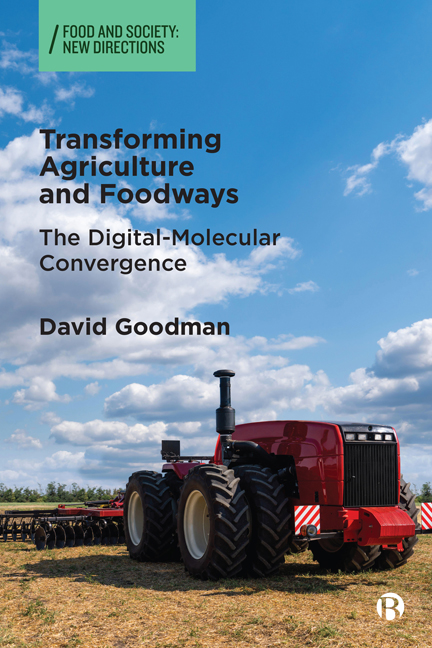Book contents
- Frontmatter
- Dedication
- Contents
- Series Preface
- List of Abbreviations
- Acknowledgements
- 1 Introduction: Technological Convergence and Change in Modern Agro-Food Systems
- 2 Precision Agriculture: Big Data Analytics, Farm Support Platforms, and Concentration in the AgTech Space
- 3 Precision Agriculture: Adoption, ‘Re-Scripting’, Farmer Identity, Path Dependence, and ‘Appropriationism 4.0’
- 4 Alternative Proteins: Bio-Mimicry, Structuring the New Protein Industry, ‘Promissory Narratives’, and ‘Substitutionism 4.0’
- 5 Agri-Biotechnology and the Failed Promises of the Seed-Chemical Complex, CRISPR and Gene Editing, and Regulatory Capture
- 6 Between Physical Space and Digital Space: COVID-19, Platform Capitalism, and Changing Patterns of Food Provisioning
- 7 Conclusion: Continuities in Change and Lost Opportunities
- Postscript
- Notes
- References
- Index
1 - Introduction: Technological Convergence and Change in Modern Agro-Food Systems
Published online by Cambridge University Press: 18 January 2024
- Frontmatter
- Dedication
- Contents
- Series Preface
- List of Abbreviations
- Acknowledgements
- 1 Introduction: Technological Convergence and Change in Modern Agro-Food Systems
- 2 Precision Agriculture: Big Data Analytics, Farm Support Platforms, and Concentration in the AgTech Space
- 3 Precision Agriculture: Adoption, ‘Re-Scripting’, Farmer Identity, Path Dependence, and ‘Appropriationism 4.0’
- 4 Alternative Proteins: Bio-Mimicry, Structuring the New Protein Industry, ‘Promissory Narratives’, and ‘Substitutionism 4.0’
- 5 Agri-Biotechnology and the Failed Promises of the Seed-Chemical Complex, CRISPR and Gene Editing, and Regulatory Capture
- 6 Between Physical Space and Digital Space: COVID-19, Platform Capitalism, and Changing Patterns of Food Provisioning
- 7 Conclusion: Continuities in Change and Lost Opportunities
- Postscript
- Notes
- References
- Index
Summary
Introduction
This book explores the socio-economic impacts and trajectories of techno-scientific change in the agro-food systems of post-industrial economies in the Global North, notably the United States, the European Union, and the United Kingdom. The aim is to understand how these future agro-food ‘worlds’ are being socially constructed, their likely evolution, and global implications. Our central theme unfolds against the background of two planetary crises threatening our very existence: global climate change and COVID-19. These crises weave in and out of the analysis with varying degrees of emphasis but are a constant presence throughout. Their damaging effects on food security, nutrition, and human health were compounded in 2022 by the Russia– Ukraine war that has triggered a severe global ‘cost of living’ crisis, galvanised by inflationary increases in the prices of food and fuel.
An intense wave of innovation is now sweeping over modern food systems, drawing momentum from the dynamic convergence of digital code as software-enabled information and communications technologies (ICTs) and the genetic code as molecular engineering technologies. The hybrid techno-scientific and socio-ecological progeny of this convergence are the bearers of our agro-food futures and therefore involve socio-political choices, whether tacit or overt, about the world we are making and are choosing to live in. Technologies, in other words, are irrevocably political.From this perspective, some contributors to critical food studies argue that the social implications of innovation pathways should be evaluated in anticipatory and more socially inclusive ways within a framework of ‘responsible innovation’ (Bronson, 2018, 2019; Rose and Chivers, 2018). This proposal is complemented by Carolan's (2018) insistence on a performative approach to agro-food technology that focuses not on what it is but rather on the societal consequences engendered by these emerging socio-technical forms. This critical theme runs through the book but is especially prominent in the analyses of precision agriculture (PA), alternative proteins (AP), and biotechnology.
The convergence of digital and molecular technologies in modern agro-food systems is contextualised by the political economic dominance of oligopolistic agribusiness corporations – Big Ag – whose concentrated power over agriculture R&D reproduces paths of change that are incremental and evolutionary rather than revolutionary in nature.
- Type
- Chapter
- Information
- Transforming Agriculture and FoodwaysThe Digital-Molecular Convergence, pp. 1 - 11Publisher: Bristol University PressPrint publication year: 2023

